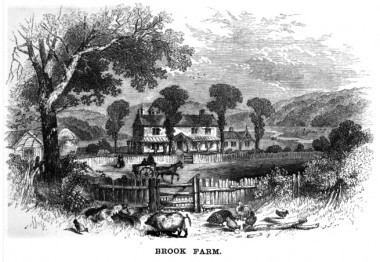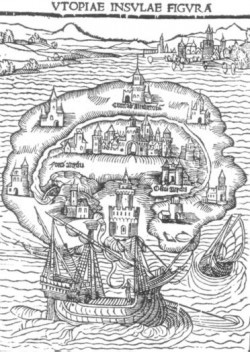Which Failed Utopia Was Best?
Which Failed Utopia Was Best?
by Chris Chafin

Based more or less out of Portland, YACHT is an esoteric dance rock band whose new album, Shangri-La, is concerned with ideas of utopia and human consciousness, as well as dance beats. Here the band’s two members, Claire L. Evans and Jona Bechtolt, rank some of the great utopian experiments of the past. While all of the below are essentially failures of utopia, the band has ranked them in order of desirability.
7. The Garden of Eden
The Biblical home of the first man and woman, all of their needs were met, and there was nothing but happiness. Eventually man is cast out for attempting to gain knowledge. From one point of view, no massive deaths; from another, every death every can be attributed to the expulsion from the Garden.¹
The entire aspiration to utopia — or, to a greater extent, heaven — comes from our fundamental desire to return to an innocent state. Call it Eden, or the “Golden Age” of Ovid, or simply the safety of the womb. In our minds, though, there’s no utopia without knowledge, difference, an understanding of evil and clothes.
6. Jackson County, Missouri
Held by the founders of Mormonism, including Joseph Smith and Brigham Young, to be the site of the Garden of Eden, early Mormons attempted to establish “New Jerusalem,” a physical Kingdom of God, in Jackson County. Mormons lived there from 1831–1838, before being forced out by local settlers after a series of violent conflicts (typified by massive deaths).
For all its mumbo-jumbo, Mormonism holds a lot of traction for its believers because it’s the only young religion with an epic military past. Say what you will about L. Ron Hubbard’s Navy career or his difficulty with the mainstream psychiatric establishment, Scientology doesn’t have anything like the “Mormon Wars” under its belt. No Scientologists were ever driven, en masse, out of a state like the Mormons were forcibly expelled from Missouri. We hope the Church of Scientology doesn’t read this and decide to militarize. Err, cool your jets, Miscavige! The so-called promised land of Jackson County definitely wasn’t a desirable utopia, not with an angry, be-pitchforked mob fomenting at its borders.
5. The People’s Republic of China
Founded in 1949 following the end of the Chinese Civil War, the PRC is based on a variant of Marxist communism that is typified by a focus on nationalism, a unified population, and the belief that human consciousness is the key factor in human history. While Maoist policies in the PRC are estimated to be responsible for 40 to 70 million deaths (what some might call massive), China is currently the world’s #2 economy by volume and a global leader in renewable energy research.
YACHT went on a two-week tour of China in 2009; we did the entire thing on a shoestring budget with the help of an interpreter/promoter who booked us gigs in rock clubs in Beijing and Shanghai as well as places like the Tibetan plateau, in Xining, where we played to an audience that had never seen white people before. We rode on hard-back trains for unreal distances and visited remote monasteries where people in full National Geographic garb were building yak butter sculptures. We came up against many creepy totems of People’s Republic information control, but we also met a lot of young, completely punk rock kids, and we learned this: all firewalls have cracks.
4. The Branch Davidian Compound
The Branch Davidians are a Protestant sect that originated in 1955 from a schism in the Davidian Seventh Day Adventists. The group came to prominence in the early 1990s while living on a 77-acre compound near Waco. The group was led at the time by David Koresh, whose teachings included having been told by God to procreate with the women in the group to establish a “House of David” of his “Special People.” This involved married couples in the group dissolving their marriages and agreeing that only David Koresh could have sexual relations with the wives. Branch Davidian teachings also include total abstinence from flesh foods, that daily worship should be kept at the 3rd and 9th hours of the natural day and that judgment of the living began in the heavenly sanctuary in 1955. Ended in massive deaths.
The United States was founded on the radical, pseudo-communistic, wife-swapping psychedelic madness of rogue spiritual groups not unlike the Branch Davidians; unfortunately, David Koresh and his “Special People” were late to the party. The Waco siege is one of the most sickening chapters in modern American history — it almost reads like an Orwellian allegory about what happens when your beliefs go against the grain. Sure, Koresh was a dubious Holy Roller stockpiling guns in the middle of Texas. But that doesn’t justify the FBI burning 20 children and a handful of pregnant women to a crisp. We actually wrote a song about Waco a couple of years ago, called “B-Side Suicide,” which had the refrain, “They set the walls on fire the day you died / The ATF called upon the FBI.”
3. Jonestown
A utopian community founded in Guyana by The People’s Temple. Led by charismatic leader Jim Jones, The People’s Church stressed racial and economic equality, the adoption of children, faith healing and so-called “religious communalism,” in which members would donate their material possessions to the Temple in exchange for the Temple meeting all those members’ needs. The temple would eventually devolve into paranoia, which would result in massive deaths. At the time, the Jonestown Massacre was the single biggest non-natural disaster loss of US civilian life in history, until eventually being surpassed by the September 11th attacks.
The scary thing about Jonestown is how noble its intentions were from the quick; its inhabitants, at the beginning, saw themselves building a community free of racism, buoyed by faith. If you look at archival footage of the construction of Jonestown, it’s men and women of all ages and races, working together, singing in the sun. The whole sordid thing happened — and fell apart — because it was founded on earnest hope, and nobody wanted to let go of that. Easier just to lie down on the jungle floor and pretend like that was the plan to begin with. When it comes down to it, a lot more of us would drink the Kool-Aid than we’re comfortable admitting.

2. Brook Farm
Brook Farm was perhaps the best-known 19th-century utopian experiment, due to its famous supporters, who included Nathaniel Hawthorne, Ralph Waldo Emerson and Bronson Alcott (father of Louisa May Alcott). Founded in 1841 and located at Ellis Farm in west Roxbury, MA, it was inspired in part by the philosophies of Transcendentalism.
The American Northeast is dotted with the ruins of dozens of 19th-century Utopian communities — places with names like Oneida, New Harmony, Hopedale, Fruitlands and Brook Farm. What happened to them? Maybe it’s impossible to transpose a fundamentally individualist philosophy like Transcendentalism onto a group. Maybe it’s a monumental bore to spend your life farming in New England. We like to think that the secret of utopia is that it’s been temporal all along: places like Brook Farm and the other failed American communities probably were heaven on Earth for two, three years. But like peaking on drugs for the rest of your life, utopia quickly becomes hell without variety.
1. The Shakers
A Christian sect, the Shakers believed in communal living, productive labor, celibacy, pacifism, the equality of the sexes and a ritual noted for its dancing and shaking. Their communities were once found throughout the UK and New England. The sole surviving community is in New Glochester, Maine. No known massive deaths.
Of all these utopian groups, the Shakers come closest to what we’re trying to do with YACHT, in particular with the live show. They practiced a kind of spontaneous, shamanistic worship that manifested itself in “gifts” of inspired music, dance, and rebus-esque notation; they lived a life of chastity, but they seemed to understand the need for ecstatic experience — the wildness of their spiritual roll was only equaled by the extremity of their erstwhile austerity. They danced like dervishes. Normally, we use the shorthand of Hakim Bey’s “Temporary Autonomous Zone” to describe YACHT concerts, but the structure of Shaker worship is equally applicable. After all, at a concert, people come together with a vague goal of transcendence, with the desire to connect with their fellows. We try to satisfy that with the creation of a temporary lawless environment.

Unranked — Utopia
The term “utopia” was originally coined by Sir Thomas More in his 1516 work of the same name. His imagined utopia featured an heavy emphasis on agriculture, a welfare state with free hospitals, euthanasia permissible by the state, priests being allowed to marry, divorce permitted, premarital sex punished by a lifetime of enforced celibacy and adultery being punished by enslavement, among other ideas. Fictional — no massive deaths.
Utopia is interesting, because it’s actually one of the more hellish-sounding fictional states in literary history. To wit: travel around the island of Utopia is allowed only with a draconian internal passport system. Premarital sex is unlawful, punishable by a lifetime of enforced celibacy. Women have to confess their sins to their husbands monthly. Fun things like makeup and astrology are verboten. Slavery is used as both the primary form of punishment for breaking the law (adultery, traveling without a passport, makeup, etc.) and as the economic support of the entire enterprise. Granted, it was published in the 1600s, but we’d almost rather live in medieval Britain than Utopia. That said, More’s book gave a name to humanity’s universal striving for a return to Eden, and we’ve been improving on the idea — with varying degrees of success — ever since.
¹ All blurbs sourced from Wikipedia and the National Park Service’s “Utopias in America.”
Chris Chafin writes for a few places about things you can listen to, play or consume. Here’s his Tumblr, which isn’t super compelling.
